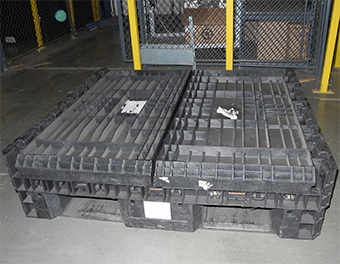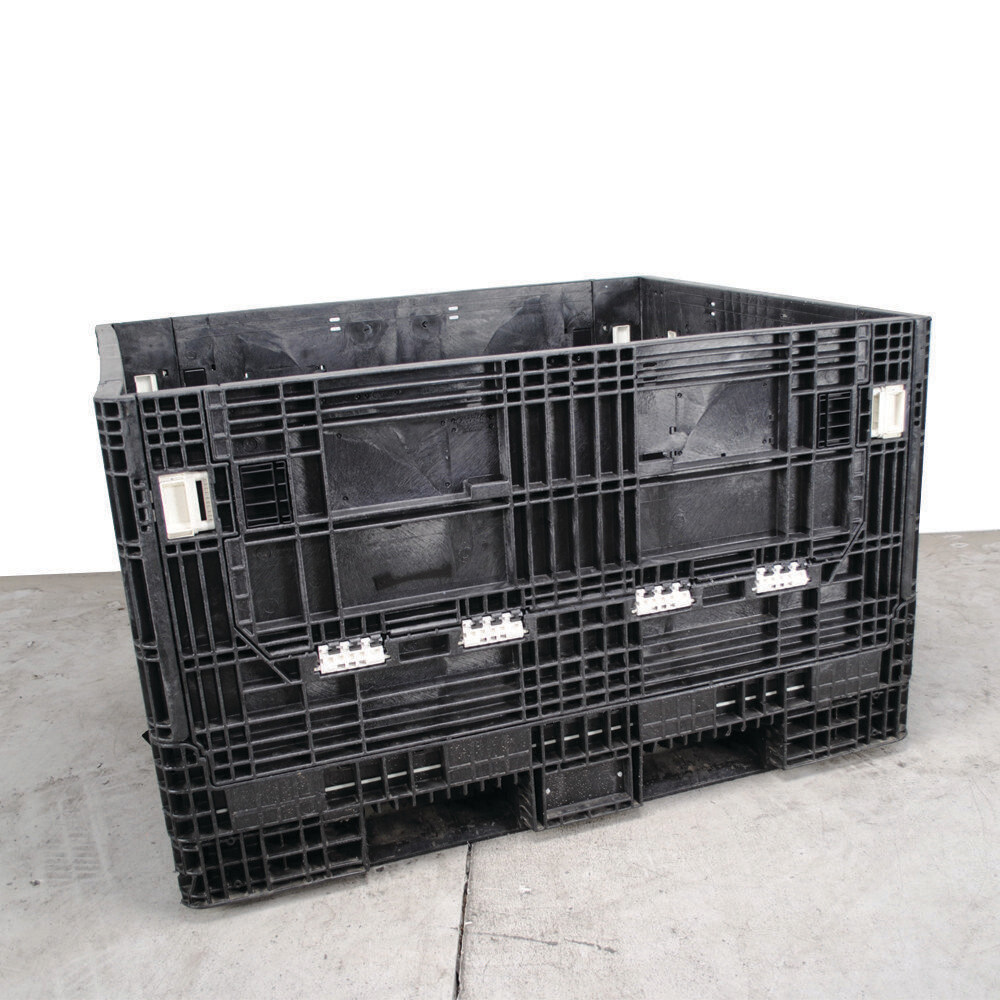Why Bulk Containers Are Vital for Lasting and Cost-Effective Transport
Mass containers play an important duty in modern-day logistics. They assist in the efficient movement of large amounts of goods, therefore optimizing transportation procedures. This technique not only decreases costs but also reduces environmental impact via reduced discharges and waste generation. As markets look for more lasting methods, the fostering of mass containers is coming to be significantly significant. What implications does this shift hold for future logistics and supply chain monitoring?

The Benefits of Making Use Of Mass Containers in Logistics
Bulk containers transform logistics by improving performance and sustainability. These containers permit for the transport of huge amounts of products in a solitary trip, markedly decreasing the variety of trips needed. This not only enhances operations yet likewise decreases labor costs connected with handling, packing, and unloading. On top of that, bulk containers are made to enhance space use within transport lorries, ensuring that more products can be shipped all at once.
The standardization of mass containers likewise simplifies the logistics procedure. With uniform dimensions, they can be easily piled and stored, leading to improved warehouse administration. Bulk containers often include long lasting materials that protect materials from damage throughout transportation, thereby decreasing product loss and enhancing overall dependability. Consequently, organizations can experience enhanced supply chain efficiency, inevitably bring about boosted success and client satisfaction. This mix of aspects makes bulk containers an essential property in contemporary logistics.
Ecological Impact: Minimizing Waste and Carbon Impact
As sectors significantly focus on sustainability, the adoption of bulk containers has actually become a crucial strategy for decreasing waste and lowering carbon footprints. These containers decrease making use of product packaging products, such as boxes and plastic, thus significantly lowering overall waste generation. By settling deliveries, mass containers enhance transportation performance, enabling for even more items to be delivered per journey. This reduction in trips directly correlates with lower greenhouse gas discharges, contributing to a smaller carbon impact.
In addition, mass containers can usually be reused or recycled, better alleviating environmental effect. The sturdiness of these containers guarantees they can stand up to several transport cycles, decreasing the requirement for single-use alternatives. refurbished bulk containers. By streamlining logistics and advertising efficient source use, mass containers not only sustain sustainable techniques but likewise motivate markets to align with international ecological objectives. Eventually, their implementation shows a dedication to ecological stewardship and responsible source administration
Expense Cost Savings: How Mass Containers Lower Transport Costs
While lots of companies seek methods to improve their profits, making use of mass containers offers a significant possibility for decreasing transport expenditures. Mass containers make the most of the volume of products transferred, enabling organizations to deliver bigger quantities simultaneously. This efficiency reduces the variety of trips called for, straight lowering fuel prices and decreasing labor costs related to loading and dumping.
Furthermore, mass containers commonly include streamlined layouts that optimize area usage within transportation cars. This means fewer voids, bring about much more effective use available capability. The sturdiness of mass containers can lower the danger of item damages throughout transportation, reducing losses and guaranteeing that more goods show up undamaged.
Enhancing Supply Chain Performance With Bulk Storage Solutions
Mass storage space solutions play a necessary duty in enhancing supply chain effectiveness by optimizing stock management. By consolidating items into fewer, larger containers, services can significantly decrease managing expenses connected with regular transfers and processing. This structured strategy permits better monitoring and management of supply, inevitably leading to enhanced functional performance.
Streamlined Stock Administration
Efficient inventory administration is vital for optimizing supply chain operations, especially when organizations adopt bulk storage space remedies. These options allow businesses to maintain greater supply degrees while lessening the frequency of replenishment. By consolidating materials into mass containers, firms can enhance their stock procedures, reducing the intricacy related to tracking numerous smaller packages. This strategy assists in precise inventory matters and enhances projecting precision, enabling for more enlightened decision-making. On top of that, bulk storage space options simplify warehouse company, making it less complicated to find and access items when needed. Consequently, organizations can accomplish a more reliable stock turnover price, eventually boosting general supply chain performance and decreasing the chance of stockouts or overstock circumstances.

Lowered Handling Costs
The application of mass storage solutions not only enhances supply management however likewise substantially reduces dealing with prices throughout the supply chain. By combining products right into bulk containers, business lessen the demand for constant handling and transfer between different storage and transport systems. This strategy reduces labor costs connected with loading, discharging, and relocating smaller sized bundles. Additionally, bulk storage space reduces the frequency of shipments, resulting in reduced transport expenses and reduced fuel usage. Therefore, companies can enhance their logistics operations, permitting a much more reliable allocation of sources. Inevitably, lowered taking care of expenses add to enhanced general supply chain efficiency, promoting a setting that sustains both sustainability and economic practicality.

Flexibility of Bulk Containers Across Different Industries
Lots of sectors have distinctive needs for transport and storage space, mass containers have actually arised as a functional solution that fulfills a broad variety of requirements. These containers, ranging from large bins to specialized tanks, can accommodate diverse materials, including granules, powders, and fluids. In the farming market, bulk containers assist in the transportation of grains and fertilizers, while the food and drink sector uses them for components and completed products. The chemical market depends on mass containers for safely transporting harmful products, making sure compliance with security laws. In addition, building firms profit from mass containers for carrying accumulations and various other products. Their flexibility extends to numerous settings of transportation, consisting of trucks, trains, and ships, enhancing logistical performance. This flexibility not only simplifies procedures across various industries however also promotes sustainability by decreasing product packaging waste and maximizing space in transit. Therefore, bulk containers play an important role in modern supply chain monitoring.
Future Fads in Mass Container Usage and Sustainability
The future of bulk container usage is progressively shaped by innovative products development that boosts sustainability. Furthermore, automation in logistics guarantees to simplify operations, decreasing waste and enhancing performance. Accepting circular economic climate techniques will additionally revolutionize exactly how bulk containers are designed, used, and reused, fostering a much more lasting transportation landscape.
Cutting-edge Materials Advancement
As sectors significantly prioritize sustainability, cutting-edge materials advancement in mass containers becomes a considerable factor in improving environmentally friendly transport solutions. Scientists and producers are checking out eco-friendly plastics, recycled composites, and lightweight metals to decrease environmental effect. These materials not only decrease waste but also improve fuel efficiency by decreasing the overall weight of containers. Additionally, improvements in wise materials, which can adapt to differing conditions, improve the longevity and functionality of mass containers. The assimilation of these cutting-edge products straightens with circular economy concepts, promoting reuse and recycling. As the demand for sustainable practices expands, the development of such materials will certainly play an essential duty in forming the future of mass container usage in logistics and transport.
Automation in Logistics
Significant improvements in automation are poised to transform logistics and the application of mass containers, boosting sustainability in transport. Automated systems, consisting of drones and self-governing automobiles, are simplifying the activity of mass containers, minimizing the reliance on standard fuel-powered transport. These innovations enhance routing and loading procedures, enhancing and lessening empty miles fuel efficiency. In addition, automated supply administration systems improve monitoring and tracking of mass containers, making certain much better source allowance and decreased waste. The assimilation of the Web of Points (IoT) enables real-time data analysis, enabling proactive decision-making that lines up with sustainability goals. As automation remains to evolve, it is anticipated to drive even more developments in mass container usage, inevitably sustaining more lasting logistics methods and lowering the environmental effect of transport.
Round Economic Situation Practices
Improvements in automation are setting the phase for an extra incorporated approach to circular economic situation practices in the domain of mass container usage. As sectors increasingly accept sustainability, mass containers are being developed for long life and reusability. This shift not just minimizes waste however also improves resource efficiency. Business are taking on techniques such as closed-loop systems, where made use of containers are collected, reconditioned, and reestablished into the supply chain. Additionally, wise innovations track container life process, helping with much better administration and lowering ecological influence. The cooperation in between manufacturers, logistics suppliers, and end-users is essential in establishing criteria for sustainable container use. used collapsible bulk containers. Future patterns suggest a growing emphasis on materials that are biodegradable and recyclable, further reinforcing the circular economy's principles wholesale transport

Regularly Asked Questions
What Materials Are Mass Containers Generally Made From?
Mass containers are commonly constructed from resilient products such as high-density polyethylene, aluminum, steel, and cardboard. These products supply versatility, defense, and toughness, making them ideal for transporting various goods in various sectors successfully.
Just how Do I Pick the Right Dimension Bulk Container?
Choosing the right size mass container includes examining the volume of materials to be transferred, considering handling equipment compatibility, and assessing storage area demands. Appropriate size guarantees efficiency in transportation and reduces waste throughout delivery.
Are Mass Containers Reusable or Recyclable?
Mass containers are frequently multiple-use, made for multiple journeys, enhancing sustainability. Several can additionally be reused, depending on the products made use of. Picking recyclable choices further sustains environmental goals and lowers waste in transport practices.
What Safety And Security Laws Apply to Mass Container Transportation?
Safety and security policies for mass container transportation consist of conformity with the Division of Transportation guidelines, correct labeling of harmful products, structural honesty evaluations, and adherence to weight limits to ensure safe handling and stop accidents throughout transportation.
Exactly How Can Services Transition to Utilizing Mass Containers Efficiently?
Businesses can change to bulk containers by reviewing current logistics, training team on handling, purchasing ideal devices, optimizing inventory monitoring, and teaming up with vendors to ensure compatibility and efficiency throughout the supply chain.
As markets significantly prioritize sustainability, the adoption of bulk containers has arised as a vital technique for decreasing waste and reducing carbon impacts. By settling products website into mass containers, business can simplify their inventory processes, decreasing the complexity associated with tracking several smaller bundles. As sectors significantly focus on sustainability, innovative materials development in mass containers emerges as a considerable variable in enhancing green transportation options. Automated systems, consisting of drones and self-governing lorries, are streamlining the motion of mass containers, reducing the reliance on standard fuel-powered transportation. Additionally, automated stock administration systems improve monitoring and monitoring of bulk containers, guaranteeing much better source allocation and decreased waste.